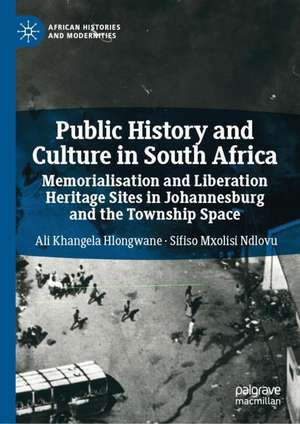Public History and Culture in South Africa: Memorialisation and Liberation Heritage Sites in Johannesburg and the Township Space: African Histories and Modernities
Autor Ali Khangela Hlongwane, Sifiso Mxolisi Ndlovuen Limba Engleză Hardback – 29 apr 2019
Din seria African Histories and Modernities
- 15%
 Preț: 695.01 lei
Preț: 695.01 lei - 20%
 Preț: 815.69 lei
Preț: 815.69 lei -
 Preț: 384.09 lei
Preț: 384.09 lei - 15%
 Preț: 577.54 lei
Preț: 577.54 lei - 18%
 Preț: 733.33 lei
Preț: 733.33 lei - 18%
 Preț: 734.27 lei
Preț: 734.27 lei - 18%
 Preț: 739.31 lei
Preț: 739.31 lei - 15%
 Preț: 587.85 lei
Preț: 587.85 lei - 15%
 Preț: 642.51 lei
Preț: 642.51 lei -
 Preț: 418.45 lei
Preț: 418.45 lei - 15%
 Preț: 641.71 lei
Preț: 641.71 lei - 15%
 Preț: 704.17 lei
Preț: 704.17 lei - 18%
 Preț: 733.33 lei
Preț: 733.33 lei - 15%
 Preț: 703.38 lei
Preț: 703.38 lei - 15%
 Preț: 527.32 lei
Preț: 527.32 lei - 15%
 Preț: 698.94 lei
Preț: 698.94 lei -
 Preț: 485.61 lei
Preț: 485.61 lei -
 Preț: 386.99 lei
Preț: 386.99 lei - 18%
 Preț: 781.45 lei
Preț: 781.45 lei - 18%
 Preț: 894.97 lei
Preț: 894.97 lei - 15%
 Preț: 694.69 lei
Preț: 694.69 lei - 9%
 Preț: 753.51 lei
Preț: 753.51 lei - 15%
 Preț: 641.16 lei
Preț: 641.16 lei - 18%
 Preț: 783.20 lei
Preț: 783.20 lei - 15%
 Preț: 643.00 lei
Preț: 643.00 lei - 18%
 Preț: 900.49 lei
Preț: 900.49 lei - 15%
 Preț: 699.59 lei
Preț: 699.59 lei - 15%
 Preț: 644.49 lei
Preț: 644.49 lei - 15%
 Preț: 587.53 lei
Preț: 587.53 lei - 15%
 Preț: 703.06 lei
Preț: 703.06 lei - 15%
 Preț: 587.39 lei
Preț: 587.39 lei - 15%
 Preț: 582.63 lei
Preț: 582.63 lei - 15%
 Preț: 586.88 lei
Preț: 586.88 lei -
 Preț: 385.47 lei
Preț: 385.47 lei - 15%
 Preț: 703.71 lei
Preț: 703.71 lei - 18%
 Preț: 744.22 lei
Preț: 744.22 lei - 15%
 Preț: 643.16 lei
Preț: 643.16 lei - 15%
 Preț: 590.95 lei
Preț: 590.95 lei - 15%
 Preț: 587.53 lei
Preț: 587.53 lei
Preț: 704.87 lei
Preț vechi: 829.25 lei
-15% Nou
Puncte Express: 1057
Preț estimativ în valută:
134.89€ • 140.31$ • 111.36£
134.89€ • 140.31$ • 111.36£
Carte tipărită la comandă
Livrare economică 14-28 aprilie
Preluare comenzi: 021 569.72.76
Specificații
ISBN-13: 9783030147488
ISBN-10: 3030147487
Pagini: 257
Ilustrații: XIX, 282 p. 31 illus., 27 illus. in color.
Dimensiuni: 148 x 210 x 29 mm
Greutate: 0.64 kg
Ediția:1st ed. 2019
Editura: Springer International Publishing
Colecția Palgrave Macmillan
Seria African Histories and Modernities
Locul publicării:Cham, Switzerland
ISBN-10: 3030147487
Pagini: 257
Ilustrații: XIX, 282 p. 31 illus., 27 illus. in color.
Dimensiuni: 148 x 210 x 29 mm
Greutate: 0.64 kg
Ediția:1st ed. 2019
Editura: Springer International Publishing
Colecția Palgrave Macmillan
Seria African Histories and Modernities
Locul publicării:Cham, Switzerland
Cuprins
1. Introduction.- 2. Worker history in the post-apartheid memory/heritage complex: Public art and the Workers' Museum in Newtown, Johannesburg.- 3. Remembering Sharpeville Day and fashioning national narratives: The Human Rights Precinct and the Langa Memorial.- 4. The historical and cultural significance of the Hector Pieterson Memorial and Museum as a liberation heritage site.- 5. Weaving stories, memories, public history, visual art and place: The June 16, 1976 Interpretation Centre, Central Western Jabavu, Soweto.- 6. Autobiographic memories of society and the June 1976 uprising.- 7. Traces, spaces and archives, intersecting with memories, liberation histories and storytelling: The Apartheid Museum and Nelson Mandela House Museum.- 8. Concluding remarks: A snippet on voices still crying to be heard.
Notă biografică
Ali Khangela Hlongwane is an honorary professor at the University of South Africa and a researcher at the University of Witwatersrand History Workshop. He has published chapters in the multi-volume The Road to Democracy in South Africa.
Sifiso Mxolisi Ndlovu is Professor of History at the University of South Africa and the author of The Soweto Uprisings: Counter-memories of June 1976 (1998) and African Perspectives of King Dingane kaSenzangakhona: The Second Monarch of the Zulu Kingdom (Palgrave, 2017).
Textul de pe ultima copertă
The post-apartheid era in South Africa has, in the space of nearly two decades, experienced a massive memory boom, manifest in a plethora of new memorials and museums and in the renaming of streets, buildings, cities and more across the country. This memorialisation is intricately linked to questions of power, liberation and public history in the making and remaking of the South African nation. Ali Khangela Hlongwane and Sifiso Mxolisi Ndlovu analyse an array of these liberation heritage sites, including the Hector Pieterson Memorial and Museum, the June 16, 1976 Interpretation Centre, the Apartheid Museum and the Mandela House Museum, foregrounding the work of migrant workers, architects, visual artists and activists in the practice of memorialisation. As they argue, memorialisation has been integral to the process of state and nation formation from the pre-colonial era through the present day.
Caracteristici
Examines the memorialisation of South Africa’s liberation struggle in the context of a complex political landscape Brings together the authors’ experiences as former activists against apartheid and their expertise in public history, historiography, and heritage studies Appeals to scholars and students of South African history, memory studies, public history, heritage studies, political history, and cultural history
